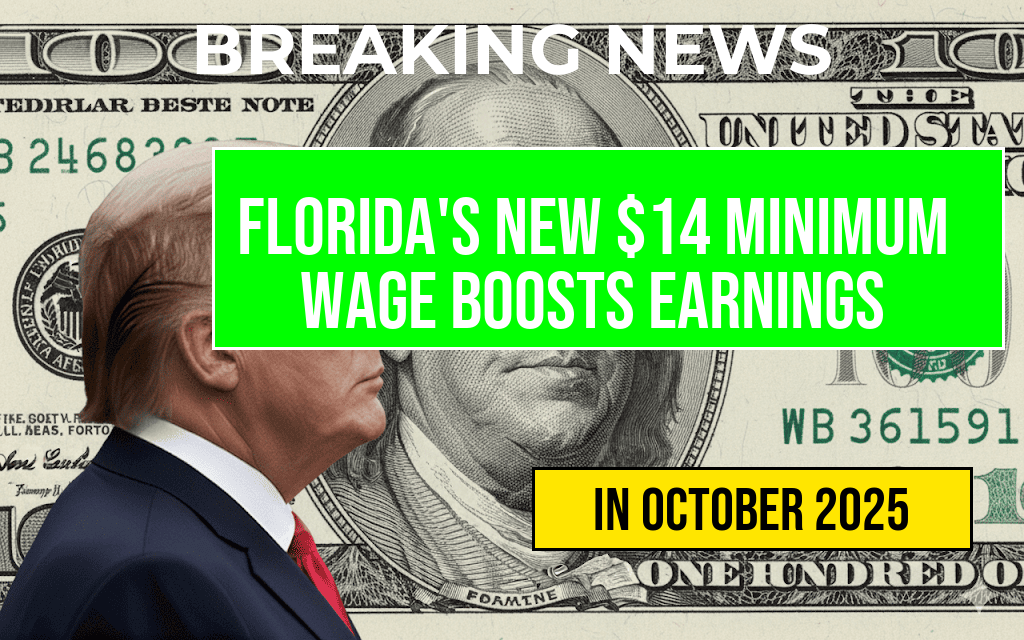The recent decision to implement a $14 per hour minimum wage in Florida is set to significantly impact the financial landscape for many residents. Starting in January 2024, full-time workers earning this new minimum wage will see an increase in their annual earnings by approximately $2,080. This adjustment comes as part of a broader initiative to help low-income families and individuals navigate the ever-rising cost of living in the Sunshine State. As employers prepare for this wage increase, economists and advocates alike are examining the potential ramifications for the workforce and the economy as a whole.
Impact on Workers
The increase to $14 an hour represents a vital step in addressing wage stagnation and the increasing cost of living. For full-time employees, this translates to a gross annual income of about $29,120, up from the previous minimum wage of $12 per hour, which equated to around $24,960 annually. This additional $2,080 could make a significant difference in the lives of many Floridians.
Benefits of the Wage Increase
- Enhanced Financial Stability: The extra income can assist families in managing expenses such as rent, utilities, and groceries.
- Increased Consumer Spending: With more disposable income, workers are likely to contribute to local economies through increased spending.
- Potential for Reduced Poverty: Higher wages can help lift individuals and families above the poverty line, improving overall quality of life.
Reactions from Business Owners
While many workers welcome the wage increase, some business owners express concerns about how it will affect their operations. Small businesses, in particular, may struggle to accommodate the higher payroll expenses. Critics argue that the increase could lead to higher prices for goods and services, as businesses pass on the costs to consumers. Others worry about potential job cuts or reduced hiring rates as companies adjust to the new wage structure.
Business Strategies for Adaptation
To mitigate the effects of the wage increase, many businesses are exploring various strategies:
- Streamlining Operations: Companies may look for ways to improve efficiency and reduce costs to maintain profitability.
- Investing in Technology: Automation and technology can help reduce labor costs in the long term.
- Raising Prices: Some businesses may choose to increase prices to offset higher wages, which could affect consumer behavior.
Economic Outlook
The economic implications of the minimum wage increase are under close examination by policymakers and economists. Supporters argue that raising the minimum wage is essential for addressing income inequality and boosting consumer spending. Research from the U.S. Department of Labor indicates that states with higher minimum wages often experience stronger economic growth.
Potential Challenges Ahead
Despite the potential benefits, challenges remain. The Florida economy, heavily reliant on tourism and service industries, may face unique hurdles as businesses grapple with labor costs. Moreover, inflationary pressures could negate some of the gains workers experience from the wage increase. Economists warn that ongoing monitoring will be crucial to understanding the long-term effects of this policy change.
Looking Forward
As Florida prepares to implement the $14 minimum wage, a variety of stakeholders will be watching closely. Workers are hopeful for improved financial security, while businesses are strategizing ways to adapt. Policymakers will need to remain vigilant in evaluating the impact on the economy, ensuring that the benefits of this wage increase are not overshadowed by unintended consequences.
Conclusion
The upcoming wage increase in Florida promises to reshape the financial landscape for many residents. While the $14-per-hour minimum wage is a significant step toward improving livelihoods, both workers and businesses must navigate the challenges that accompany such a change. The state’s economic resilience will be tested as it embraces this new chapter in wage policy.
Frequently Asked Questions
What is the new minimum wage in Florida?
The new minimum wage in Florida is set at $14 per hour.
How much will full-time workers earn with the new minimum wage?
Full-time workers can expect to see an increase of $2,080 in their annual earnings due to the new minimum wage.
When will the new minimum wage take effect?
The implementation date for the new $14/hour minimum wage in Florida is yet to be confirmed, but it is part of a progressive increase plan.
Who will benefit from the increase in minimum wage?
All full-time workers earning at or below the previous minimum wage will benefit from the increase, leading to higher annual earnings.
How does the new minimum wage compare to previous rates?
The new $14/hour rate represents a significant increase from Florida’s previous minimum wage, reflecting efforts to improve worker compensation.






